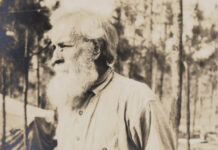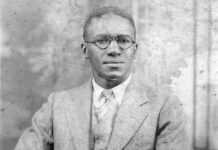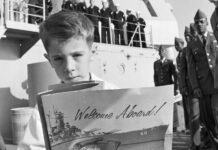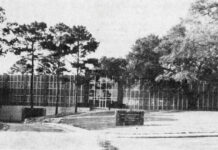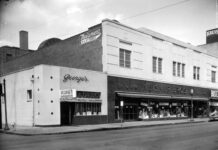


Vietnam shaped a generation of Americans and changed the country forever. The divisive conflict lasted well over a decade, during which more than 58,000 Americans were killed and 300,000 were wounded. The war bitterly divided the nation, bringing protests and mistrust of the government, as well as inflation and a reluctance to enter into foreign conflict for decades. It saw an end to the draft and it lowered the voting age. Soldiers returned home to name-calling instead of ticker-tape parades and many veterans struggled to make sense of the horrors of war. Despite all that, many south Alabamians bravely fought for their country and did their duty as soldiers, medics, and more. Of the approximately 2.7 million Americans who served in the war, less than 600,000 are alive today. In honor of the 50th anniversary of the fall of Saigon and the end of the Vietnam War on April 30, 2025, Mobile Bay Magazine is sharing the stories of four local veterans in four monthly installments. We honor their bravery and commitment to our country, and thank them for their service.

First Lieutenant Talmadge Cain
Talmadge Cain was a student at the University of South Alabama in 1965. The Vietnam War wasn’t on his mind.
“Then I had a motorcycle accident and missed a month of school,” Cain said. “Uncle Sam came calling with a letter from the draft board, saying ‘Greetings.’”
Cain was sent to Infantry Officer Candidate School and became a second lieutenant. He had just turned 21 and took 30 days leave to “party like there was no tomorrow” before going to Vietnam in August 1968 — the bloodiest year of the war.
When he arrived in Vietnam, he boarded a helicopter that carried him into a mountainous area to meet his unit: a mechanized battalion attached to the 173rd Airborne with 52 people and 13 armored personnel carriers.
“A mechanized battalion is a little bastard unit with a whole lot of firepower,” he said. “We were our own little firebase in the middle of nowhere. We went into combat at 50 miles an hour with machine guns blazing.”
His battalion was stationed in An Khe, a small town about 50 miles north of Saigon, next to the dangerous Mang Yang Pass and its steep mountain road.
“The pass was famous in warlore because the French got their butts kicked there,” Cain said. “My unit kept the road open for supplies, food and ammo. There was an ambush two or three times a week.”
An election was approaching in South Vietnam. Cain’s platoon was ordered to clear the enemy out of a small village, about the size of a square block, so the villagers would feel safe enough to vote.
“We landed and started getting fired on,” Cain said. “The rule was to get down when somebody shoots at you, then figure out what you’re going to do.”

Cain’s platoon made an arc around the village, firing back. He saw the Viet Cong running out and called for choppers to cut them off. The Viet Cong kept firing. The punji stick was another Viet Cong weapon. Sharpened on one end like a spear and sometimes smeared with human feces, the punji sticks were driven into the ground and hard to see. Cain said he fired a shot each time he spotted one.
He had just yelled, “Look out!” when a punji stick jammed into the top of his right ankle.
He turned around and hollered, “Be careful. I’m stupid and just stepped on one.”
Then he sat down on another punji stick.
“They flew me out for medical help because I had sticks in my ankle and my right buttocks,” he said. “That’s how I earned a Purple Heart.”
Cain took care of his platoon, promoting them as fast as possible. At Christmas, he dressed as Santa, with his gun on his hip, to boost the morale of his troops. There were no presents or special meals — just a little Charlie Brown Christmas tree.
After coming home from Vietnam, Cain committed to the Army for another 18 months because he didn’t know what else to do. He became a captain. Cain said being an officer was good for him, but he left the military and put Vietnam behind him.
“The U.S. getting into jungle warfare in Asia and fighting it like past wars was the stupidest thing we could do,” he said. “I moved on because I had a family to support and more life to live.”
Americans didn’t talk about the Vietnam War for a long time, Cain said. Veterans weren’t recognized or celebrated by the public. They weren’t welcome at VFWs. However, Vietnam veterans led the charge for the Veterans Administration to take better care of all veterans, and Cain volunteered to help veterans get their benefits.
“Today, everyone thanks us, and millions more claim to be Vietnam veterans. Now, it’s cool to be a Vietnam vet.”

Colonel Patrick Downing
Colonel Patrick Downing wasn’t a good student. He dropped out of Murphy High School in his junior year and wanted to join the military like his dad and uncle. His mother reluctantly signed her permission for early entry. Downing was 17 and didn’t know anything about Vietnam.
“A close friend had just enlisted,” Downing said. “Back then, joining the service was a popular thing to do.”
Downing joined the Army in 1960, soon transferring to the Special Forces. He completed the parachute jump school and was promoted to sergeant. He re-enlisted, took a medical training course and graduated in June 1964. A few months later, Downing married Patricia, his childhood sweetheart; she was pregnant with their first child when he was sent to Vietnam in March 1965.
Camp Suoi Da was Downing’s new home. The camp received rounds of enemy mortar fire on Downing’s first night. The outgoing American team called it a “welcome from the Viet Cong.”
Downing was one of 12 Americans on the US Special A-Team working with more than 500 South Vietnamese and Cambodian Strike Force soldiers, called strikers. He still remembers the smells of strikers cooking on charcoal stoves in the camp.
“The charcoal smoke combined with the odors of whatever was being cooked hung over the camp most of the day and into the night,” Downing said. “Outside the camp were smells of animal dung and sour mud in the rice paddies. We got used to that.”
Downing called the day-to-day existence in camp “an almost surreal atmosphere.”
“Maybe it was all of the war movies I watched when I was younger, but it was like we were actors on a movie set, just sitting around and waiting for the director to shout ‘action.’”
“Action” could be the enemy firing into camp or a radio crackling with a report of enemy contact. Downing was once pinned down by small arms fire in an ambush; his handheld AM radio was the only thing hit.
“I didn’t get a scratch,” he said. “But if the bullet hit an inch or two, either way, the outcome might have been different. I was fortunate in Vietnam: I zigged instead of zagged.”

One of Downing’s most memorable combat operations was in June 1965. He moved slowly with a team of strikers through thick jungle and crossed a stream filled with leeches.
“We stopped to pull off the leeches, and I got a message: ‘Born June 15, mother and baby girl are fine. All systems go.’ I was so happy to hear I had a baby daughter and that she and Patricia were both fine.”
As the A-Team medic, Downing carried first-aid and surgical kits with blood expander, saline solution and morphine syrettes. He also used his medical training in monthly sick calls to nearby villages, helping with examinations, infections and one complicated baby delivery.
At the end of his tour, Downing was accepted for Officers Candidate School (OCS), even without a college education.
“The Army needed a lot of new lieutenants because they were losing quite a few in battle,” he said.
Downing graduated from Infantry OCS and moved up to company commander. He was also a Ranger and a Pathfinder. He was sent back to Vietnam in 1969-1970 as the U.S. began withdrawing American forces and preparing South Vietnamese to take over the war.
“At that time, I thought we were winning,” he said.
But on April 30, 1975, Downing watched the fall of Saigon on TV as the helicopters picked up the last Marines from the U.S. embassy.
“It was sickening,” he said. “We had spent that many years in Vietnam. So much treasure and lives. So many wounded who will never recover. But you have to go on, and we did.”
Downing served in the U.S. Army for more than 36 years and retired as a Colonel. He received his undergraduate and graduate degrees and attended Harvard University’s John F. Kennedy School of Government on a fellowship.
“Any success I had in the Army and life, I credit to my time in the Special Forces and to the great soldiers and leaders I served with there.”

Second Lieutenant John Roussos
John Roussos attended Florida State University and was a member of the Army ROTC. He graduated and became a second lieutenant in the U.S. Army in 1968, the bloodiest year of the Vietnam War. The Tet Offensive weakened American support and strengthened peace protests across the country. Roussos’ first military assignment was riot duty in Washington D.C.
“We went wherever they expected trouble and tried to control the riots,” Roussos said. ”We didn’t like that duty, but we had no choice.”
Then Roussos got his orders for the Vietnam War: platoon leader for the 10th Armored Cavalry, called “The Cav,” stationed near the Cambodian border in the jungles and central highlands.
The Cav, equipped with tanks and armored personnel carriers, searched for “Charlie” — the Viet Cong — and attacked when possible. Booby traps were everywhere, and the platoon was always on alert.
“We were on duty 24/7,” Roussos said. “I didn’t sleep in Vietnam. I answered every radio call from my platoon, even at four in the morning. I took care of my men, making sure they were safe and knew their mission.”
Roussos said they were fortunate to travel in tanks, but driving 49.5-ton armored vehicles was tough during the monsoons. Halfway through a resupply mission, a tank threw a track. It was midnight, and the jungle was muddy.
“We set up a perimeter and secured the area before we performed maintenance,” he said. ”It was pouring rain, but we finally returned to our responsibilities. Things like that were always going on.”
On a trip to base camp, picking up the funds to pay his unit, Roussos stopped by the officer’s club for a drink and started talking with a company commander who had just lost his executive officer. Roussos was hired to work at headquarters for his last four months in Vietnam.
“I was elated to get out of the rain, the heat and the jungle,” he said. “To leave the mosquitos and enemy fire.”


Roussos said he was more excited to board a plane and leave Vietnam. It was “going from hell to heaven.” But the last leg of his flight home was delayed for four hours. He landed in Memphis close to midnight. The stewardess told him to wait a few minutes before getting off.
“I thought it was just my wife waiting for me,” he said. “But 200 of my friends and family had signs and balloons there to surprise me. They were in good spirits.”
Roussos’ family had paid an airport bar to stay open the extra hours.
“They were having a fun time waiting for my late arrival, and I missed one of the greatest welcome-home parties there ever was,” Roussos said. “This was my homecoming parade. Many Vietnam veterans were not treated as respectfully or fairly when they returned home. They just went back to work.”
Roussos came home in 1970. He was busy working in the Roussos family restaurant on the Causeway when the war ended on April 30, 1975.
“Accepting the defeat was hard for those who fought there,” he said.
Roussos still doesn’t tell the stories of combat but prays every day his grandsons don’t have to go through the same thing.
“We did all of this and failed,” he said. “We lost about 57,000 troops and didn’t win. That’s not how the United States is supposed to accomplish our tasks.”
Read the full ‘Stories of Vietnam’ Series:
Part I: First Lieutenant Skeeter Morris | Part II: General Guy Hecker | Part III: First Class/Lance Corporal Elbert Wingfield

